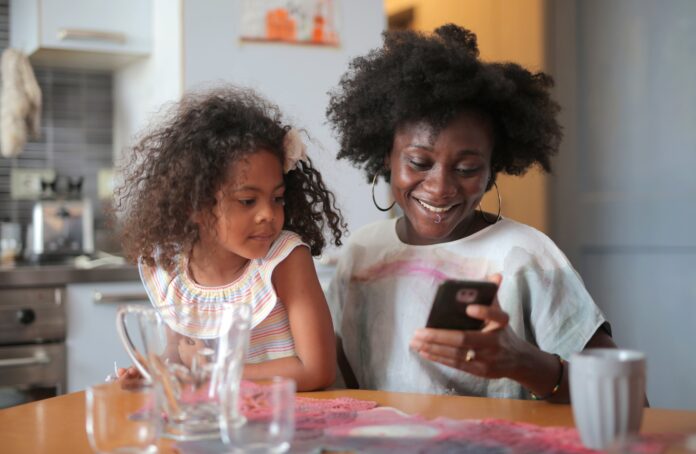
Nia Thomas, 29, was speaking with her mother through a jail phone when she received news that sent her into tears.
“She was like, ‘Nia, they said they’re coming to get you! They said they’re coming to get you,” she says about the May 2021 call.
Her mom was yelling about Barred Business — an Ellenwood, Georgia, organization that agreed to pay off Thomas’ $50K bond in time for Mother’s Day.
“And so I called the number to verify, like, ‘Are y’all really coming to get me, or is my mom tripping,” Thomas says.
But it wasn’t a hoax. After a series of bank runs, the organization gathered her bond in cash down to the cent — as the jail required — and purchased her freedom.
After nearly a year away from her children, she returned to her family safely.
“I really had lost hope. I didn’t think that I was going to be bonded out,” Thomas says.
Every year, Barred Business and organizations around the country bail Black moms out of jail during the week leading up to Mother’s Day. The annual efforts are led by National Bail Out, a Black-led and Black-centered collective of abolitionist organizers, lawyers, and activists.
This year, the #FreeBlackMamas collective has freed 25 moms and counting across 13 states — disrupting the cash bail system that separates Black mothers from their children and imposes health risks.
Bail Is a Burden for Black Single Moms
80% of women in jails are mothers, and most are single parents responsible for young children, according to a 2016 report by the Vera Institute of Justice.
This hits home for Black women, who, despite making up only 13% of U.S. women, represent 44% of women in jail.
Even though they haven’t actually been convicted of a crime, most Black moms sit in city or county jail cells for months or years awaiting trial because they can’t afford to pay bail.
Bridgette Simpson, co-executive director of Barred Business, says her organization has posted bail as high as $350,000.
”That system is set up in a way that it purposely separates families, that it purposely keeps Black women in for a longer period of time,” she says.
These Georgia bailouts are made possible through crowd-funding and a local partnership with FAAM (the Free Atlanta Abolition Movement).
In the week leading up to Mother’s Day, Simpson’s team paid for the release of eight women at Atlanta’s Fulton County jail, but only five were freed. The other three were indicted on charges that weren’t bondable as they were being bailed out, Simpson says.
“So many women are still in their languishing because they have this whole entire year or two to indict them,” she says.
Harsh Jail Conditions Cause Mental Illness
Many women enter the carceral system with preexisting mental illness, but incarceration is known to worsen symptoms or cause major depressive and bipolar disorders.
Jails are breeding grounds for behavioral health issues because of the poor conditions, including lack of fresh air, limited access to healthy food and healthcare, and disconnection from loved ones.
Simpson says incarceration “skews” mental health.
“Especially under solitary confinement, they don’t allow people out for more than one hour per day to socialize, to communicate, to be a human being,” she says.
That was the case for Thomas, who experienced a 23-hour lockdown that “messed with me mentally.”
“You’re in a room with people that have not taken showers because they’ve missed showers. You’re in a room where the toilets are leaking, flooding the room. Or they’re not working, and somebody uses the restroom, and now the room is stinking,” she says.
And sometimes there’s violence.
Simpson recalls witnessing officers tase two naked women in a shower during an argument. One of the women was tased in the head.
“She ended up falling out, having a seizure, hit her head. They had to rush her to the emergency room,” she says. “So, it’s just a couple of things that I’ve never seen in my life that traumatized me, and it messed with me mentally.”
Luckily, once she was released, she easily accessed care.
Finding Hope And Help After Incarceration
Barred Business provides mental health support to women once they’re home. That’s how Thomas learned she had PTSD, bipolar disorder, racing mind syndrome, and severe depression.
“I had issues beforehand, and I didn’t really know because when you get locked up, you try to cope, and you try to make it seem like everything’s OK within yourself,” she says.
The organization also offers job training, housing, free clothing, legal defense training, and release parties with food and music.
“We love on the women who come home because a lot of them haven’t had the first chance, much less asking for a second chance,” Simpson says.
Simpson knows what it’s like to be newly released with sights set on a new start. As someone who served 10 years in prison as a mother, doing this work brings back memories.
“I try not to cry, but I cry every single time [a woman is released] because I think of myself, wishing that someone came for me,” she says.
Thomas wishes all incarcerated Black moms had access to organizations like Barred Business because “everyone deserves a second chance at life.”
“I really just want to thank them for allowing me to be able to fight for myself on the outside because, on the inside, it’s like a railroad. There is no stopping.”


